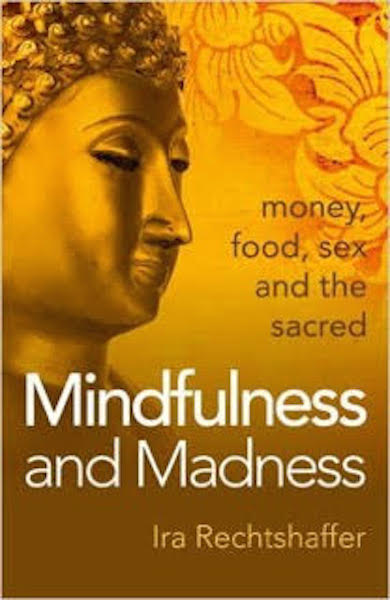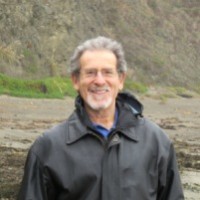
“Tender Courage” is an extract from Ira Rechtshaffer’s book, Mindfulness and Madness: Money, Food, Sex and the Sacred, recently published by John Hunt Publishers under the imprint of Changemakers.
~
Meditation suggests that it is refreshing to meet the nakedness of situations with your own nakedness, here and now.
Outside of nowness, we fail to genuinely appreciate our lives because we are struggling to survive in time, projecting ourselves into the future or attempting to resolve the past.
As spiritual practitioners it is necessary to question who we are in essence, beyond our social roles as parents, spouses, family members, friends and colleagues and beyond our occupational roles. What is this human life really about?
The good news is that the tradition of Buddhism addresses this question by offering a method of inquiry. Meditation is a profound practice that has been passed down during the past 2600 years ago. We have the recipe for how to discover our essential nature as a human being.
If you give yourself to the practice of meditation wholeheartedly, you will meet yourself face to face.
In this moment, if you allow yourself to become sensitive to your immediate condition, you will discover that you are breathing with ease. You might notice also that your chest and abdomen are rising and falling rhythmically with the cyclical movement of breath. You are not required to perform the activity of breathing, for it is already handled by your autonomic nervous system, as is the beating of your heart and the circulation of your blood. At this moment you might notice a panoramic view of rolling hills or a skyline of skyscrapers out your window, or hear the hum of cars on the freeway. It is not necessary to struggle to see the landscape or hear the cars any better than you already do. You are not required to struggle to maintain your existence.
I have been describing basic being—the most fundamental sense of what it is to be a human being.
This quality of being existed before we divided the world into good and bad, inner and outer, past and future. Basic being is the human capacity to experience ‘things as they are’ before we project our labels onto them. We could call this naked experience ‘isness’ or ‘suchness,’ which is a translation of the Sanskrit term, tathata.
The secret for how to experience this natural quality is to completely open to this arising moment, this second!
In the moment that we touch it with awareness, we must also refrain from holding onto it, from trying to make it our personal territory. We touch the immediacy of this living moment and let go—trusting that it will return. Usually we slip off that razor-sharp edge of nowness due to our habitual hunger for distraction and entertainment. We’re not sure how to name this loss of balance, or whether to even call it a problem since this seems so normal. But this so-called normalcy is sheer madness. It is the unconscious rejection of the ‘here and now’ in favor of the ‘then and there‘, as we hope for a more gratifying moment than the one we’re already in.
When we’re not living in the immediacy of now, there’s a feeling that we’re distant from the hot center of our lives. We feel disconnected from the joy that we may have remembered as kids, that free-floating spontaneous sense of ‘mindless’ happiness. To miss these precious moments means that we are lost in action, hitchhiking between memory and desire.
The practice of meditation returns us again and again to this basic space of nowness from which our lives unfold. This basic space is none other than Buddha nature and it expresses itself as wisdom and compassion. Although this is our natural inheritance as human beings, we mistakenly identify Buddha nature with the ego-self, our mental picture of ourselves, which is only a fragment of our inconceivable totality. The dimension within us that is basic being has depth, value, relatedness and real substance. It is a sense of presentness and presence. The great secret is that it is revealed only when we show up in our totality, with our head, heart and belly.
It takes tender courage to sit and face our fears and our depressions, to discover the deepest elements of mind and body without trying to change them, in order to see the truth of ‘what is’. Such tender courage allows us to cultivate deep listening from the heart. By allowing space so that we can appreciate very simple experiences, we discover our awakened heart.
The most fundamental experience is that of being alive as a human being, prior to accomplishing anything or fulfilling our desires. We must dare to claim the right to be here on this good earth, at this precious time. Meditation encourages us to communicate with all aspects of our being and all aspects of experience. In order to do this we must be vulnerable, gentle, tender and open to all aspects of ourselves, the good and the bad, the ugly and the beautiful.
To allow ourselves to be touched by basic being means that we drop our agenda over and over again. We drop our strongly held beliefs and open to the possibility that our life may turn out to be completely different than what we had imagined. When we are not holding ourselves so tightly, we have the chance to see both ourselves and the world without wanting either to be different from the way they are. We don’t always love our partners, our parents or our good friends. To hold onto such beliefs may prevent us from meeting the moment we’re already in.
Losing a job is supposed to be unfortunate, and breaking up with a loved one is supposed to be terribly sad and gut wrenching. Perhaps such endings lead to a more creative job or a new beautiful life with someone else. We could discover a mixture of devastation and delight.
Meditation suggests that it might be refreshing to approach everyday life without armor, meeting its nakedness with our own. We reach a point where we recognize that we don’t have to change ourselves, our spouses, or our friends, in an attempt to make them better. The situations that we find ourselves in may be fine just the way they are.
On the Buddhist path we cultivate tender courage by making friends with ourselves (maitri in Sanskrit) by honoring the experience we’re already having. Without this intimate connection to ourselves, we cannot appreciate our world or be of service to anyone else. Only when we establish an intimate connection with all aspects of ourselves without judgment, do we experience a sense of wholeness, a sense of being.
~
Relephant:
Samsara: The Difference Between Dogs & Lions.
~
Author: Ira Rechtshaffer
Editor: Caitlin Oriel
Image: Author’s own and Suzanne Schroeter/Flickr






Read 0 comments and reply